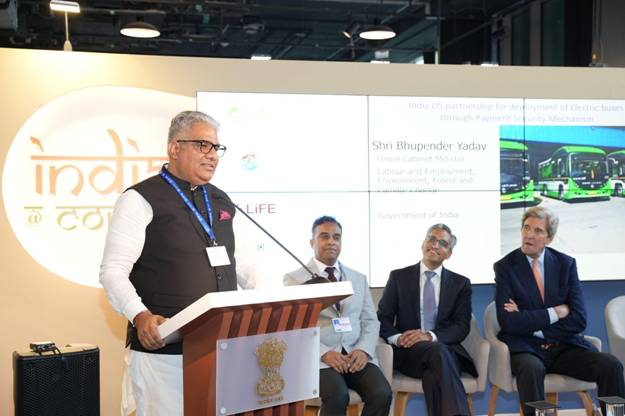Transport decarbonization must for India to achieve net-zero emissions: Environment Minister Bhupender Yadav

Decarbonization of the transport sector is essential to reduce the GHG emissions and to meet the ambitious target of achieving net-zero emissions by 2070 set by India, Union Minister for Environment, Forest and Climate Change, Bhupender Yadav has said during a side event on India- US “Payment Security Mechanism (PSM)” for e buses in India.
He said that to achieve the goal of net zero emissions, the adoption of electric vehicles plays a crucial role and given that buses serve the mass public, prioritizing electric buses is essential as a significant mode for decarbonizing the transport sector.
The India-US Payment Security Mechanism (PSM) for e-buses will serve as an incentive for both Indian and international OEMs/Bus operators to participate in e-bus operations and potentially establish a manufacturing hub in India, contributing to the growth of e-bus industry and e-bus exports.
During the visit of Prime Minister Narendra Modi to USA, that the India- US Government Joint Statement to develop a “Payment Security Mechanism” was released with an aim to facilitate the deployment of 10,000 made-in-India electric buses. The move was also reaffirmed during India’s G20 Presidency, underscoring the importance of reducing carbon emissions in the transport sector.
The Minister expressed confidence that this initiative will popularize e-buses by encouraging private sector participation in the procurement and operation of these vehicles for an extended period of 10 to 12 years, fostering their adoption throughout India.
Secretary John Kerry, US Special Presidential Envoy for Climate, said “with PSM we are taking a major footstep towards helping India electrify its bus fleet”. He said that this move was taking an Indian solution to maximize Indian opportunity to decarbonisation transportation sector.
India’s existing bus fleet stands at 1.5 million, most of which run on diesel. India rolled out a large, unified tender of 5,450 e-buses worth over $1 billion and spread across five states. Discovered prices were significantly lower than diesel. Encouraged by the success, the Government has now established a target of 50,000 e-buses. As a result, a total of 12,000 e-buses in different stages of contracting are now coming onto Indian roads.
The US-India collaboration has contributions of $240 million from the Indian Government and $150 million from the US government and their partners. The PSM aims to unlock up to $10 billion in non-recourse lending to e-bus manufacturers in India to deploy 38,000 buses.





Thannks designed forr shsring such a good thinking,
paragraph iss fastidious, thags why i havce rdad iit completely
Hey there just wante to gve you a brief heads up and
let yyou kno a few of tthe pictures aren’t loading properly.
I’m not sure whhy bbut I thinkk its a linking issue. I’ve tried itt iin twoo different browseers andd
bot show the same results.